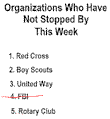
If you're looking for the textbook The Little, Brown Reader, click here.
is a free service provided by Lance Brown, Candidate for President in 2008. You can visit his campaign site and weblog here.
About Lance Brown
The Campaign "Elevator Pitch"
The Longer Pitch: The Future of America is Freedom
10 Easy Ways to Help the Campaign
Join the On-The-Road Support Network
Lance In The Media
Contact Lance
 |
Easy online actions for advancing the cause of freedom.
PNAC.info
An effort to investigate, analyze, and expose the Project for a New American Century, and its plan for a "unipolar" world.
CampusLP.org
Free web sites for campus libertarian clubs!
The Little Brown Reader
A rolling catalog of articles and web sites of significance that Lance is reading.
The Nevada County Libertarian Party
"Your Local Party of Principle" (Chairman)
The Nevada County Bill of Rights Defense Committee
Dedicated to Creating a Civil Liberties Safe Zone in Nevada County, California. (Co-founder)
The Free School on the Internet
A developing effort to create a superior online K-12 school, with free attendance.
StopCarnivore.org
Stop the FBI Spy Tool Carnivore Now!"
GreenLiberty.org
Where Green values meet Libertarian principles.
Pictures of The Bill of Rights
Tips for Promoting a Campus Event
198 Methods of Nonviolent Action
My (many) e-zine and list subscriptions
The History of Drug Prohibition in the U. S.
The Bill of Rights -- Full Text
Support freedom in our lifetime:

"I do not shrink from this responsibility, I welcome it."
A Little Worried About America
Boston Public: The Case Against Schools
The USA-PATRIOT Axe
The Nader 2004 "threat", and those poor, pitiful Democrats
Book Recommendation: Healing Our World
Taboos, skews, and contradictions
North Korea's Sensible Delusions
Lance on Regulation
December 01, 2003The Bush BetrayalI'm posting the full text of this excellent opinion piece, because I'd like to have it archived here. It was originally published in the Washington Post. By David Boaz In 2000 George W. Bush campaigned across the country telling voters: "My opponent trusts government. I trust you." Federal spending has increased by 23.7 percent since Bush took office. Education has been further federalized in the No Child Left Behind Act. Bush pulled out all the stops to get Republicans in Congress to create the biggest new entitlement program -- prescription drug coverage under Medicare -- in 40 years. He pushed an energy bill that my colleague Jerry Taylor described as "three parts corporate welfare and one part cynical politics . . . a smorgasbord of handouts and subsidies for virtually every energy lobby in Washington." It's a far cry from the less-government, "leave us alone" conservatism of Ronald Reagan. Conservatives used to believe that the U.S. Constitution set up a government of strictly limited powers. It was supposed to protect us from foreign threats and deliver the mail, leaving other matters to the states or to the private sector -- individuals, families, churches, charities and businesses. That's what lots of voters assumed they would get with Bush. In his first presidential debate with Al Gore, Bush contrasted his own vision of tax reduction with that of his opponent, who would "increase the size of government dramatically." Gore, Bush declared, would "empower Washington," but "my passion and my vision is to empower Americans to be able to make decisions for themselves in their own lives." Bush was tapping into popular sentiment. In fact, you could say that what most voters wanted in 2000 was neither Bush nor Gore but smaller government. A Los Angeles Times poll in September 2000 found that Americans preferred "smaller government with fewer services" to "larger government with many services" by 59 to 26 percent. But that's not what voters got. Leave aside defense spending and even entitlements spending: In Bush's first three years, nondefense discretionary spending -- which fell by 13.5 percent under Ronald Reagan -- has soared by 20.8 percent. His more libertarian-minded voters are taken aback to discover that "compassionate conservatism" turned out to mean social conservatism -- a stepped-up drug war, restrictions on medical research, antigay policies, federal subsidies for marriage and religion -- and big-spending liberalism justified as "compassion." When they're given a chance to vote, Americans don't like big government. Last November 45 percent of the voters in the most liberal state in the Union, Ted Kennedy's Massachusetts, voted to abolish the state income tax. In January, Oregon's liberal electorate rejected a proposed tax increase, 55 percent to 45 percent. In September Alabama voters rejected Gov. Bob Riley's $1.2 billion tax hike by 2 to 1. Bush and his aides should be worrying about the possibility that libertarians, economic conservatives and fed-up taxpayers won't be in his corner in 2004 in the same numbers as 2000. Republican strategists are likely to say that libertarians and economic conservatives have nowhere else to go. Many of the disappointed will indeed sigh a deep sigh and vote for Bush as a lesser evil. But Karl Rove, who is fascinated by the role Mark Hanna played in building the post-1896 Republican majority, should remember one aspect of that era: In the late 19th century, the Democratic Party of Jefferson, Jackson and Cleveland was known as "the party of personal liberty." More so than the Republicans, it was committed to economic and cultural laissez-faire and opposed to Prohibition, protectionism and inflation. When the big-government populist William Jennings Bryan claimed the Democratic nomination in 1896, many assumed he would draw industrial workers from the Republicans and bring new voters to the polls. Instead, Bryan lost in a landslide, and turnout declined for the next few elections. As the more libertarian Democrats found less reason to go to the polls, the Republicans dominated national politics for the next 36 years. It could happen that limited-government voters decide to stay home, or vote for an independent candidate in the mold of Ross Perot or Jesse Ventura or vote Libertarian. They could even vote for an antiwar, anti-Patriot Act, socially tolerant Democrat. Given a choice between big-government liberalism and big-government conservatism, the leave-us-alone voters might decide that voting isn't worth the trouble. The writer is executive vice president of the Cato Institute and author of "Libertarianism: A Primer." Posted by Lance Brown at December 1, 2003 05:18 PM | TrackBackComments
Please, if you want to, edit this and use it as you like to..-my or in your name. Yes, the Lawmakers are accountable to the voters, to the extent of impeachment of the Federal Justices... HELP! Freedom of Speech, Press, Religion is at stake! Restriction on Congress, or many States? Wording in the First Amendment clearly puts the restriction on one Congress (Federal), not on many States.. But there were 13 States, and if the Founding Fathers did mean that the States shall make no law ...., they surely would have worded the negative as they did in the 14th Amendment, where they clearly meant the States: To interpret the First Amendment correctly would have given every one of the "several States" the choice of Religion. I believe that the Supreme Court seen a total chaos, in commerce, and in many areas, that would follow having many States with different Religions. Solution--- ? There are many Churches, therefore Separation of Church and State is a must. But there is only one God, our Creator, if we want to keep what He has given us, we must recognize Him..It is up to the Supreme Court to interpret the Bill of Rights correctly, and the Federal and the State Congresses oversee that our Nation will adhere to the Constitution as written by our Honorable Founding Fathers. If you agree or ? with the points made above, please click on link below, to view the website: Please, if you want to, edit this and use it as you like to..-my or in your name. Yes, the Lawmakers are accountable to the voters, to the extent of impeachment of the Federal Justices... HELP! Freedom of Speech, Press, Religion is at stake! Restriction on Congress, or many States? Wording in the First Amendment clearly puts the restriction on one Congress (Federal), not on many States.. But there were 13 States, and if the Founding Fathers did mean that the States shall make no law ...., they surely would have worded the negative as they did in the 14th Amendment, where they clearly meant the States: To interpret the First Amendment correctly would have given every one of the "several States" the choice of Religion. I believe that the Supreme Court seen a total chaos, in commerce, and in many areas, that would follow having many States with different Religions. Solution--- ? There are many Churches, therefore Separation of Church and State is a must. But there is only one God, our Creator, if we want to keep what He has given us, we must recognize Him..It is up to the Supreme Court to interpret the Bill of Rights correctly, and the Federal and the State Congresses oversee that our Nation will adhere to the Constitution as written by our Honorable Founding Fathers. If you agree or ? with the points made above, please click on link below, to view the website: Please, if you want to, edit this and use it as you like to..-my or in your name. Yes, the Lawmakers are accountable to the voters, to the extent of impeachment of the Federal Justices... HELP! Freedom of Speech, Press, Religion is at stake! Restriction on Congress, or many States? Wording in the First Amendment clearly puts the restriction on one Congress (Federal), not on many States.. But there were 13 States, and if the Founding Fathers did mean that the States shall make no law ...., they surely would have worded the negative as they did in the 14th Amendment, where they clearly meant the States: To interpret the First Amendment correctly would have given every one of the "several States" the choice of Religion. I believe that the Supreme Court seen a total chaos, in commerce, and in many areas, that would follow having many States with different Religions. Solution--- ? There are many Churches, therefore Separation of Church and State is a must. But there is only one God, our Creator, if we want to keep what He has given us, we must recognize Him..It is up to the Supreme Court to interpret the Bill of Rights correctly, and the Federal and the State Congresses oversee that our Nation will adhere to the Constitution as written by our Honorable Founding Fathers. If you agree or ? with the points made above, please click on link below, to view the website: Post a comment
|
Your email address: Message (optional):
Please click the following to help my rating at these sites:
Top 25 Libertarian Sites (Currently #8) Blogarama's 'What's Cool' List (Currently #6) Blogster Top 25 (Currently #14)
Recent Entries
Explore the Archives
Index of All Entries
March 2004
February 2004 January 2004 December 2003 November 2003 October 2003 September 2003 August 2003 July 2003 June 2003
Category Archives
9/11 Big Brother Bipartisans is the Craziest Peoples! California Recall Civil Liberties Criminal "Justice" Democrats Drug War Educational Freedom Greens Human Rights Humor Left V Right Libertarians Media Presidential Campaigns RV Info and News Republicans Science Site Announcements The Big I Thought and Thinking Uncle Sam War Youth Rights
I'm a Member of:
Libertarian Party
Libertarian Party of California Nevada County Libertarian Party Nevada County Bill of Rights Defense Committee American Civil Liberties Union Amnesty International International Society for Individual Liberty
Blog Places
Blogarama
Top Blogs RCS Blogdex DayPop Technorati Blo.gs Popdex Blogosphere Blogwise Weblogs.com BlogCritics The Weblog Review Blogarithm BlogLinker Globe of Blogs BlogTracker Blog of the Day
Blogroll
Web Rings I'm In
|
||||||||||||||||||||||||||||||||||||||||||
|
All contents of this site Copyright © 1996-2003 by Lance Brown for President in 2008.
| |||||||||||||||||||||||||||||||||||||||||||

